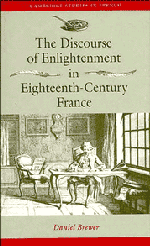Book contents
- Frontmatter
- Contents
- List of illustrations
- Acknowledgments
- Introduction
- 1 Representing knowledge: reading the Encyclopédie
- 2 Enlightenment critique and Diderot's art of philosophizing
- 3 The matter of judgment and the art of phrasing sensation
- 4 Critical narratives: Diderot's Salons
- 5 Embodying knowledge
- 6 Portraying Diderot: the aftermath
- 7 Interpreting Diderot: critical values, critical violence
- Notes
- Index
- Cambridge Studies in French
Introduction
Published online by Cambridge University Press: 23 November 2009
- Frontmatter
- Contents
- List of illustrations
- Acknowledgments
- Introduction
- 1 Representing knowledge: reading the Encyclopédie
- 2 Enlightenment critique and Diderot's art of philosophizing
- 3 The matter of judgment and the art of phrasing sensation
- 4 Critical narratives: Diderot's Salons
- 5 Embodying knowledge
- 6 Portraying Diderot: the aftermath
- 7 Interpreting Diderot: critical values, critical violence
- Notes
- Index
- Cambridge Studies in French
Summary
In a short, programmatic essay written in 1784, Immanuel Kant asks the question, “What is Enlightenment?” His answer, condensed in the motto sapere aude, dare to know, is that Enlightenment comes about once the individual strives courageously to free herself or himself from the enslaving condition of ignorance. As Kant's essay suggests, this heroic struggle for liberating knowledge (Enlightenment) also characterizes the event of the Enlightenment, thus providing a way to understand Enlightenment in historical terms. It is tempting to believe, along with Kant, that ours is an age of Enlightenment, and that in inheriting the legacy of the past we free ourselves from what Kant calls its barbarism. This emancipation from the past means freeing ourselves from the immediacy of the event through a courageous act of cognition, the Kantian sapere aude. Historical understanding, then, would involve mediating the raw experience of the event and comprehending the past as such, as experience mastered by virtue of its being represented to consciousness.
Kant's Was ist Aufklärung marks an important moment in the history of European Enlightenment, wherever one locates its beginnings and ends (assuming it has ended and that the present belongs to a post-Enlightenment age). I do not propose to rewrite that history here. Instead I wish to ask whether the history of Enlightenment might not be unwritable insofar as Kant's question is unanswerable. Or rather, Enlightenment can be made into an event and its history written, but only by refusing to consider Kant's question as a philosophical one, involving the very conditions of possibility for critical knowledge, if not its limits. This at least is how it has been heard by Michel Foucault.
- Type
- Chapter
- Information
- The Discourse of Enlightenment in Eighteenth-Century FranceDiderot and the Art of Philosophizing, pp. 1 - 12Publisher: Cambridge University PressPrint publication year: 1993
- 5
- Cited by

